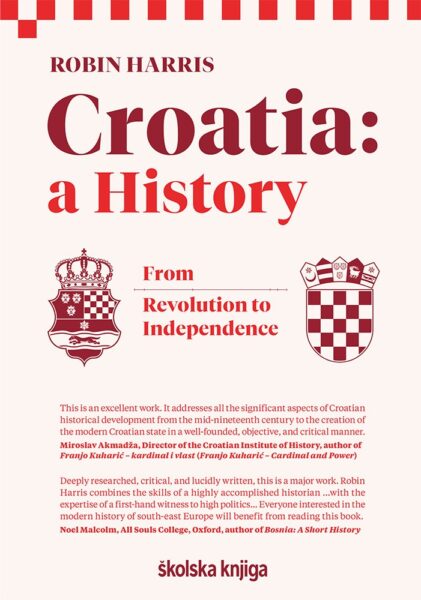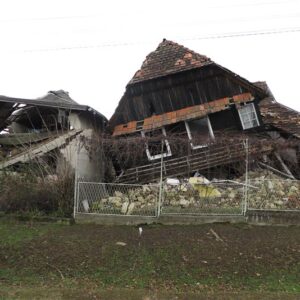From March 1978 to November 1990 Robin Harris worked for the Conservative Party and the British Government as a Special Adviser to the Treasury, Special Advisor to the Home Office, Director of Conservative Research, in the office of British Prime Minister Margaret Thatcher and after 1990 he continued as her advisor and speechwriter. A British and Croatian historian with a Croatian address, Croatian citizen since 2006, author, university lecturer, commentator, journalist, Dr. Robin Harris, has written a new book “Croatia: A History – from Revolution to Independence”, published in the English language by „Školska knjiga“, Zagreb (August 2024). This book follows his previous two books on Croatian subjects and matters. Viz., „Dubrovnik: a History“ (2003; 2006) and „Stepinac: His Life and Times“ (2016).
His involvement in events in Croatia began in the early 1990s, when the Homeland War was going very badly for Croatia. He was still an advisor to Margaret Thatcher at the time, although both had already left 10 Downing Street. From the media at the time it was clear that both Thatcher and Harris were stunned by the cynicism and weakness of the West at that turning point for Croatia whose 94% of voters clearly expressed the will to secede from communist Yugoslavia in the 1991 Independence referendum. Indeed, many will recall the legendary speeches by Margaret Thatcher supporting unequivocally the Croatian plight to exit from communist Yugoslavia. Baroness Margaret Thatcher, convinced that statehood and national states are the strongest foundation of international stability, was a staunch advocate of Croatia’s right to self-determination. She minced no words when it came to condemning the crimes and oppression committed by the communist regime upon Croatian people.
The central theme of Robin Harris’ new book revolves around how Croats initially missed the opportunity to achieve statehood and then succeeded at great cost. But the book covers much more. It is conceived as a comprehensive history – not in the sense of recounting every fact – but in the sense of describing the social, economic, cultural, intellectual and religious developments, which are interconnected during that period, not stopping only at mainland or central Croatia, but also in parts such as Istria and Dalmatia.
The following are reviews and descriptions of this new book by Robin Harris that provide to the reader of this article a quite clear idea of the quality and excellence of this book, copy of which to me appears as a must in all homes where Croatian descent lies.
“Croatia’s path to modern European statehood since 1848 has been fraught with civil strife, revolutions, two world wars and the bloody Balkan wars of the mid-1990s; Croats have been ruled by kings, emperors, fascists and the Communist Party. Today’s Republic of Croatia is a member state of the European Union – but its stability is recent, and hard-won.
Unlike most available histories of the country, Robin Harris’s compelling account of Croatia’s political and social evolution focuses on the nexus of the twentieth century. Making use of a wide range of Croatian and other sources, including historical material rarely consulted before the recent loosening of the country’s national archives, Harris tells the story of Croatia with the same narrative flair and depth of detail demonstrated in his previous works.
Harris also engages with issues fiercely debated within Croatia today, such as the uses of nationalism and the role of the murderous Ustasa party during the Second World War. He investigates the cultural and intellectual achievements, social and regional divisions and contrasting economic conditions in all the Croat lands.” Thriftbooks description.
The new book by Robin Harris, “Croatia: A History – From Revolution to Independence,” is written as a synthesis of modern and contemporary Croatian history, covering the period from the mid-19th century to the creation of the modern Croatian state. Although one might expect such a synthesis to rely primarily on available literature, this book is largely based on the author’s own research and insights into various aspects of the issues addressed within it. When existing literature is used, the author does not merely convey or summarise its content; instead, he approaches the subject matter critically and analytically, thereby arriving at new understandings of the topics he discusses. This approach is very useful particularly for the cause of correcting the often wrongly written history by enemies of Croatian independence to alight history with clarity of the truth and facts. There have been several reviews and comments written about this book and I shall present a few of those here in order to assist the reader of this article regarding this book and its contents.
It is difficult to enumerate briefly all the topics Harris covers in this extensive synthesis in English, but it should be highlighted and reiterated that this is reputed to be an excellent work. It addresses all the significant aspects of Croatian historical development from the mid-19th century to the creation of the modern Croatian state in a well-founded, objective, and critical manner.
“Deeply researched, critical, and lucidly written, this is a major work. Robin Harris combines the skills of a highly accomplished historian …with the expertise of a first-hand witness to high politics… Everyone interested in the modern history of south-east Europe will benefit from reading this book.” Noel Malcolm, All Souls College, Oxford, author of Bosnia: A Short History
“This is an excellent work. It addresses all the significant aspects of Croatian historical development from the mid-nineteenth century to the creation of the modern Croatian state in a well-founded, objective, and critical manner”.
Miroslav Akmadža, Director of the Croatian Institute of History, author of Franjo Kuharić – kardinal i vlast (“Franjo Kuharić – Cardinal and Power”)
“Robin Harris has surpassed himself…. In this compelling tour de force Harris shows that Croatia’s history is fundamentally western, with all the pluses and minuses that entails”. Brendan Simms, Professor of the History of European International Relations, Cambridge, author of Unfinest Hour: Britain and the Destruction of Bosnia
“…The scale and authority of this study places this book at the head of current literature on the history of Croatia.” David Abulafia, Professor Emeritus of Mediterranean History, Cambridge, author of The Great Sea: A Human History of the Mediterranean
It emerges from this book that the course of development of Croatian statehood was not linear but quite complex. Perhaps because, as Harris would put it, nation-building and state-building in the Croatian case had to go hand in hand. And that, was and is no easy feat especially in the circumstances where nostalgia for communist Yugoslavia persists in many places, often those of power.
Installing the values of the Homeland land, which include nation-building and state-building, has been a most difficult task to complete. To wit: as Harris explains in a recent interview for ‘Glas koncila’ “The Yugoslav communist past is present in Croatian everyday life. Its two worst manifestations are endemic corruption and the dominance of anti-fascist ideology.
All post-communist countries have experienced mass corruption. This is an important indicator. One can point to different political parties and different groups in Croatia that are associated with the scourge of corruption with varying degrees of accuracy, but the fact remains that in every socialist way of thinking there is a pervasive assumption that property is there to be stolen, not legally acquired through hard work or inheritance. Access to state loans and the influence of well-networked communist apparatchiks in the 1990s did the rest.
The second problem is anti-fascism. The concept is a colossal fraud from beginning to end. Anti-fascism is a communist construct, except in Istria and to a lesser extent Dalmatia, where anti-fascism mainly meant resistance to the Italian occupation. Anti-fascism was a useful front and, like all other fronts, served only the interests of the party. The idea that antifascism should have any relevance in today’s Croatian society is even more absurd. If there are any fascists in Croatia, I have never met them. Or are all of us who are not on the left today’s fascists? Enemies of the people? Who knows?
Antifascism is still a front, but in today’s circumstances it mostly boils down to keeping Croatia in the former Socialist Republic of Croatia narrative and not allowing the Republic of Croatia to be based on the Homeland War, not on 1945 and on everything that came with it. Antifascism is also used to attack the Catholic Church. Slander and insults that would be widely condemned elsewhere are considered acceptable because those put forward by the influential ‘antifa’ media do not consider them problematic.
Antifascism still determines what is and what is not acceptable when it comes to people, content and events taking place in public spaces in Croatian cities… The reason for determining who committed atrocities during communism is not to punish anyone, or even to demand an apology. It is to ensure that the truth comes out. The truth about Bleiburg and the numerous undiscovered mass graves across Croatia will also enlighten public opinion about the reality of communist “liberation”.”
Ina Vukic
The book “Croatia: A History – from Revolution to Independence“ can be purchased online from Školska knjiga.





